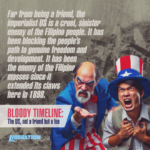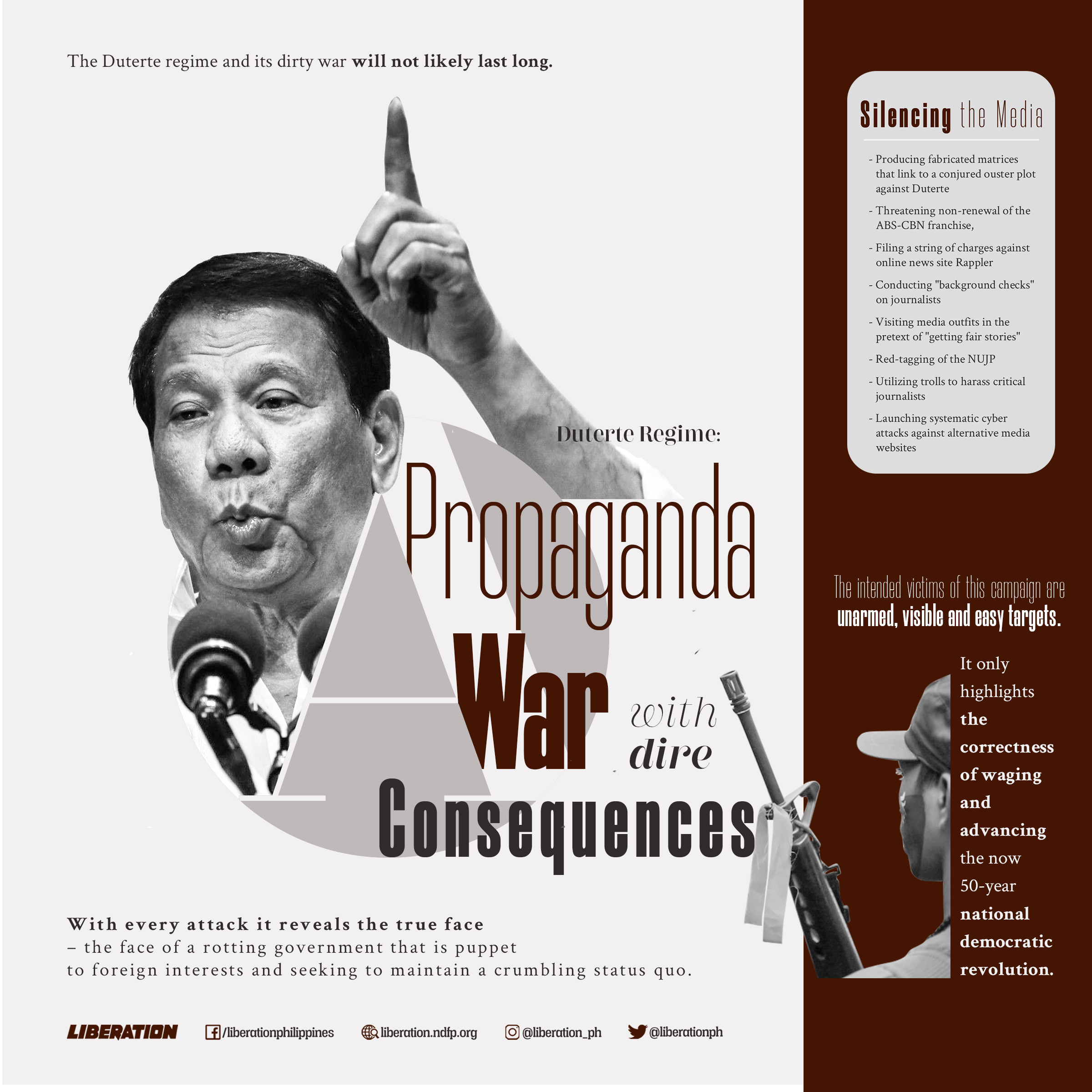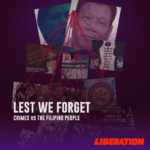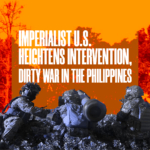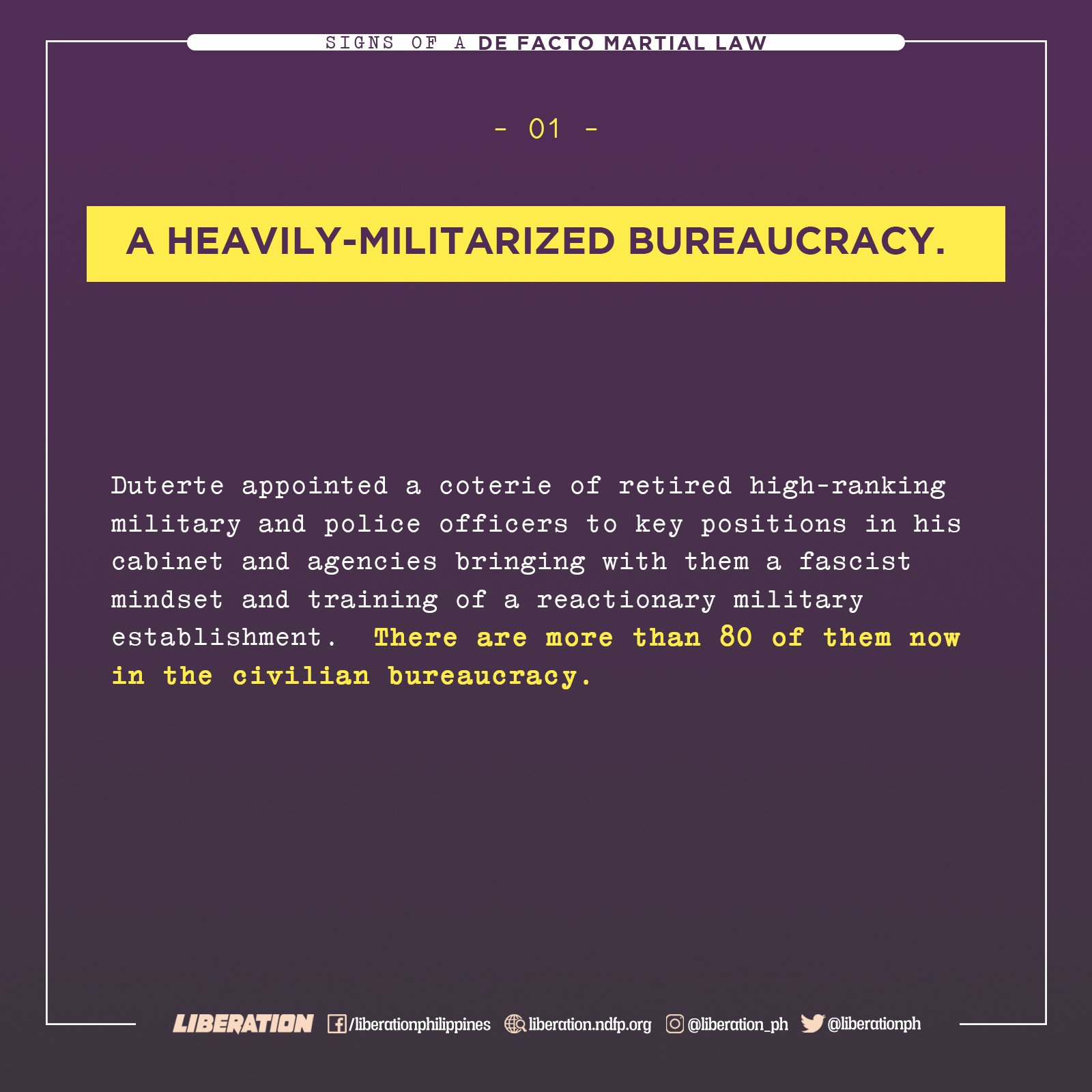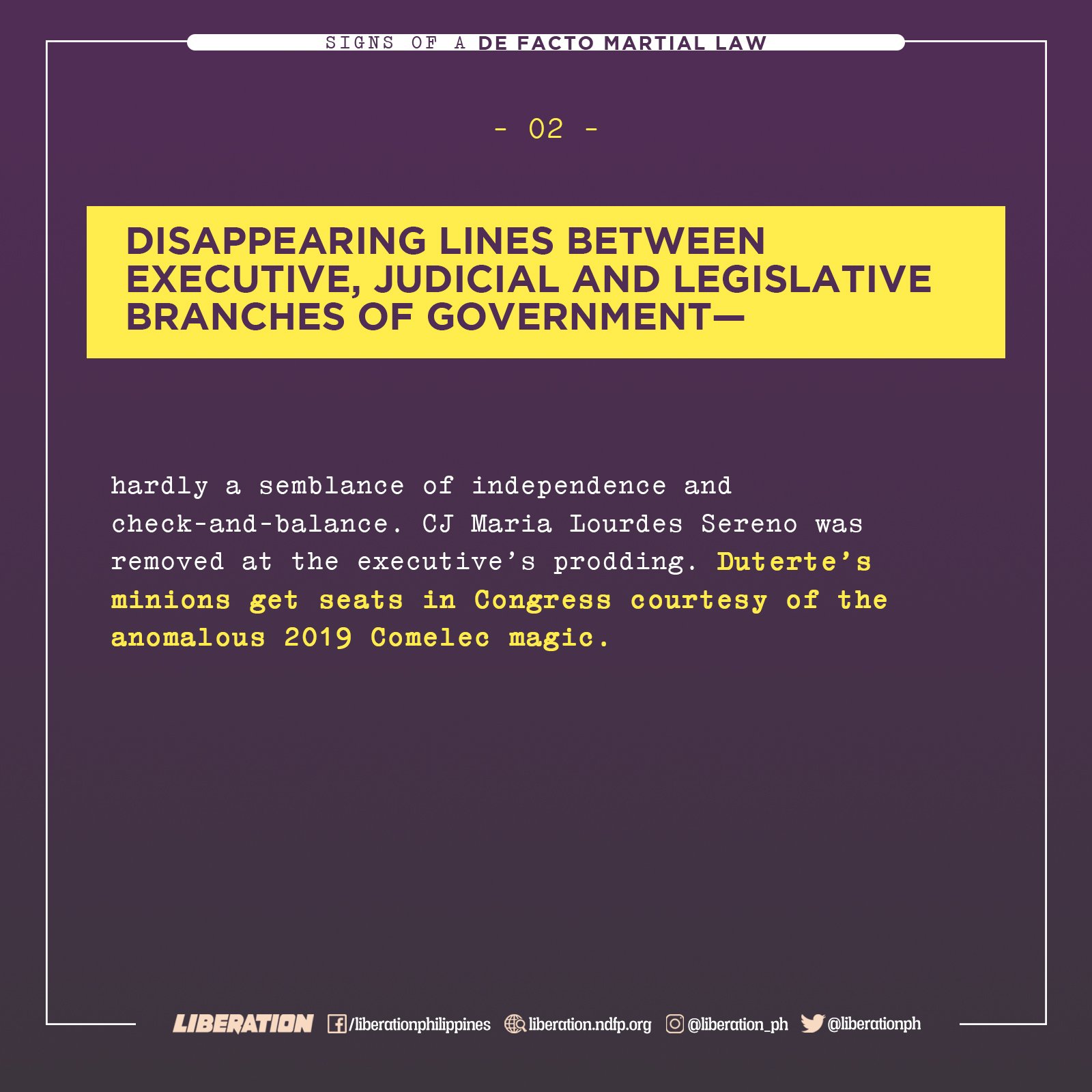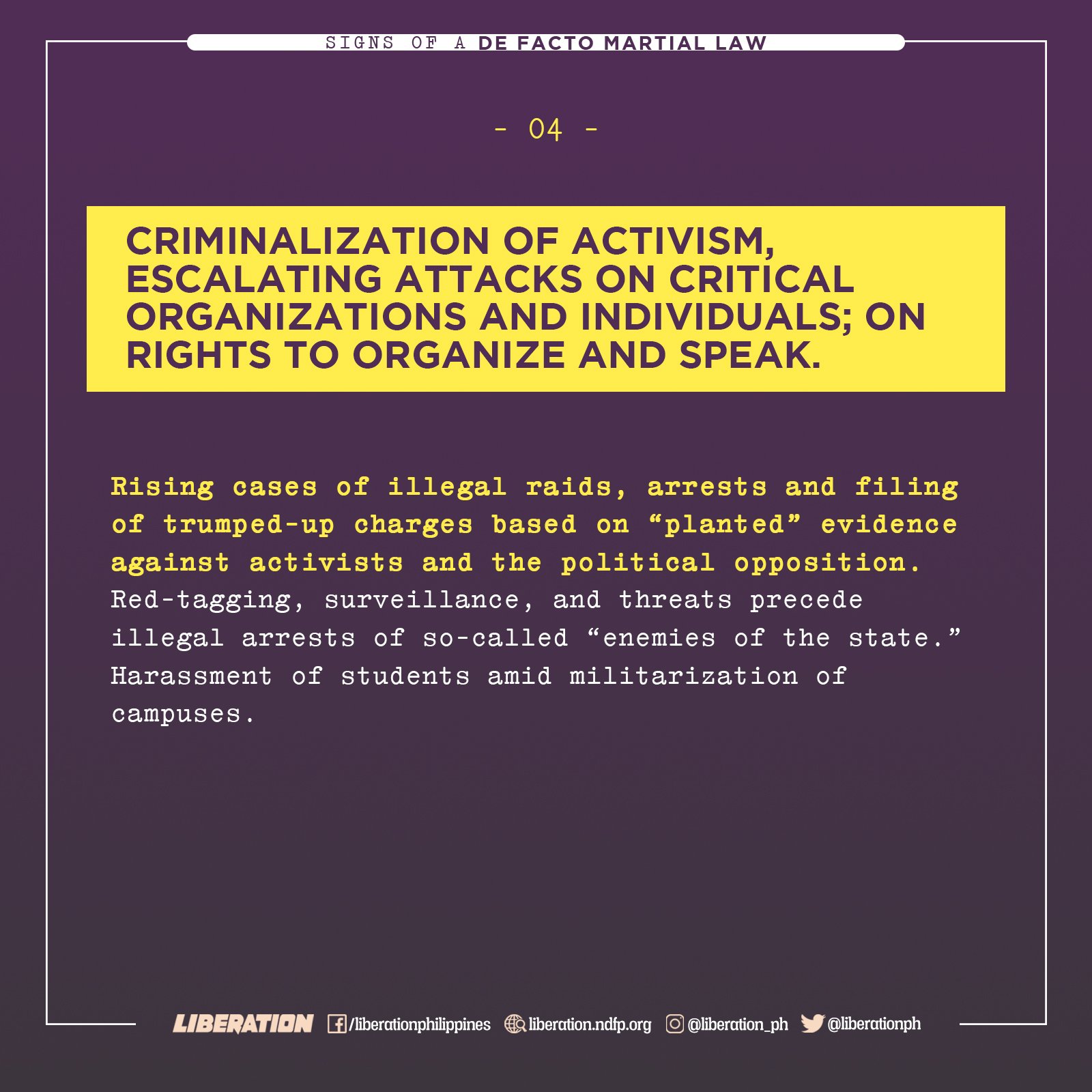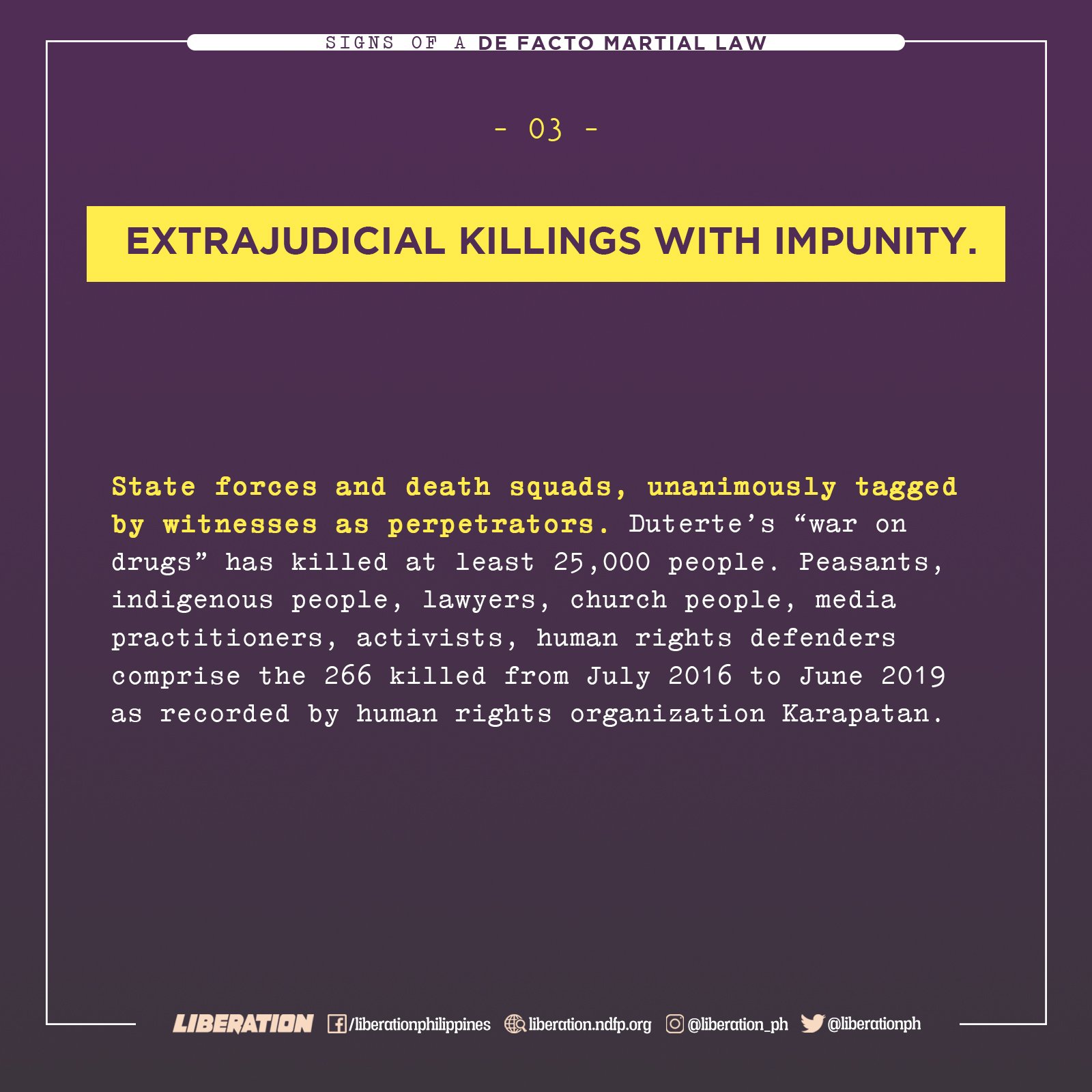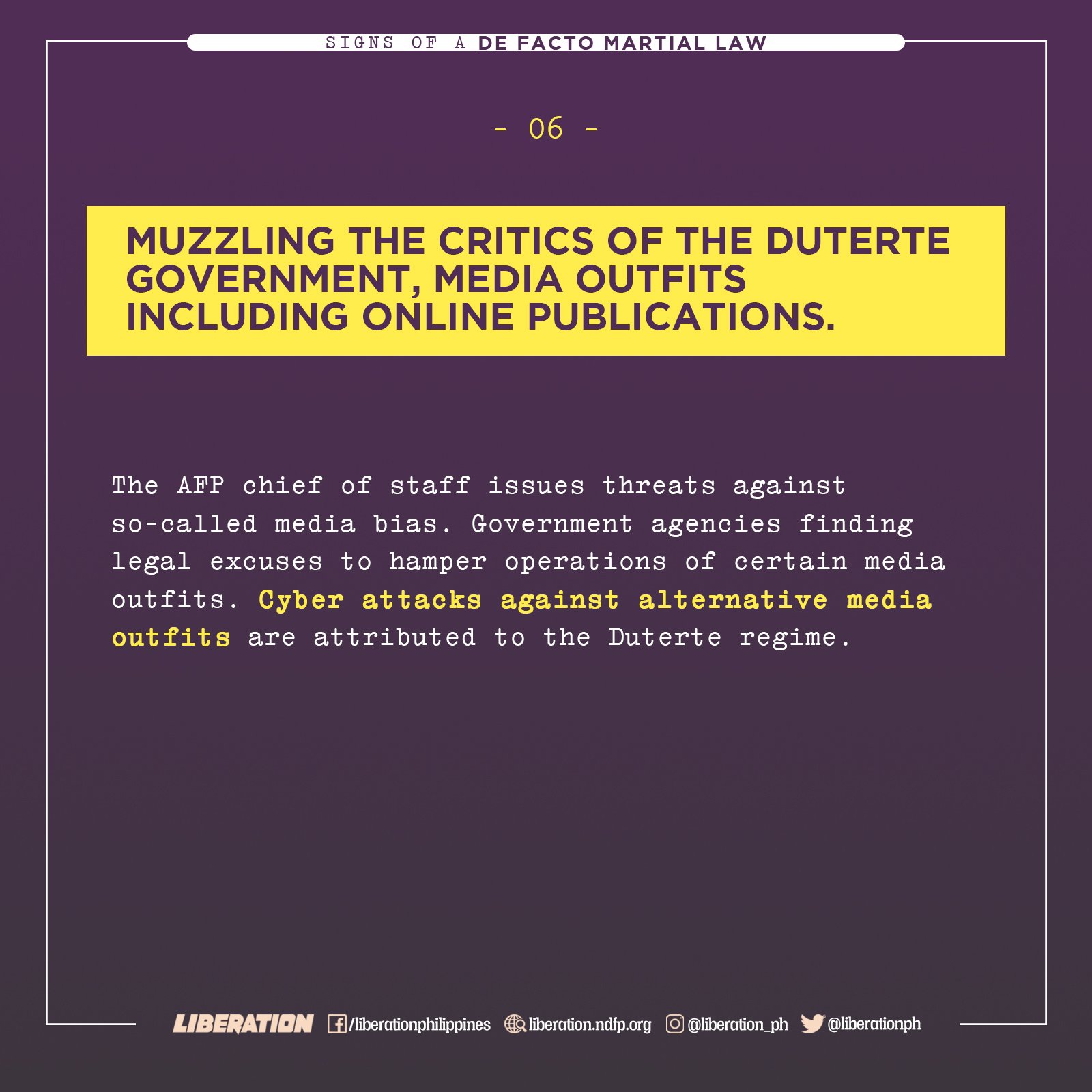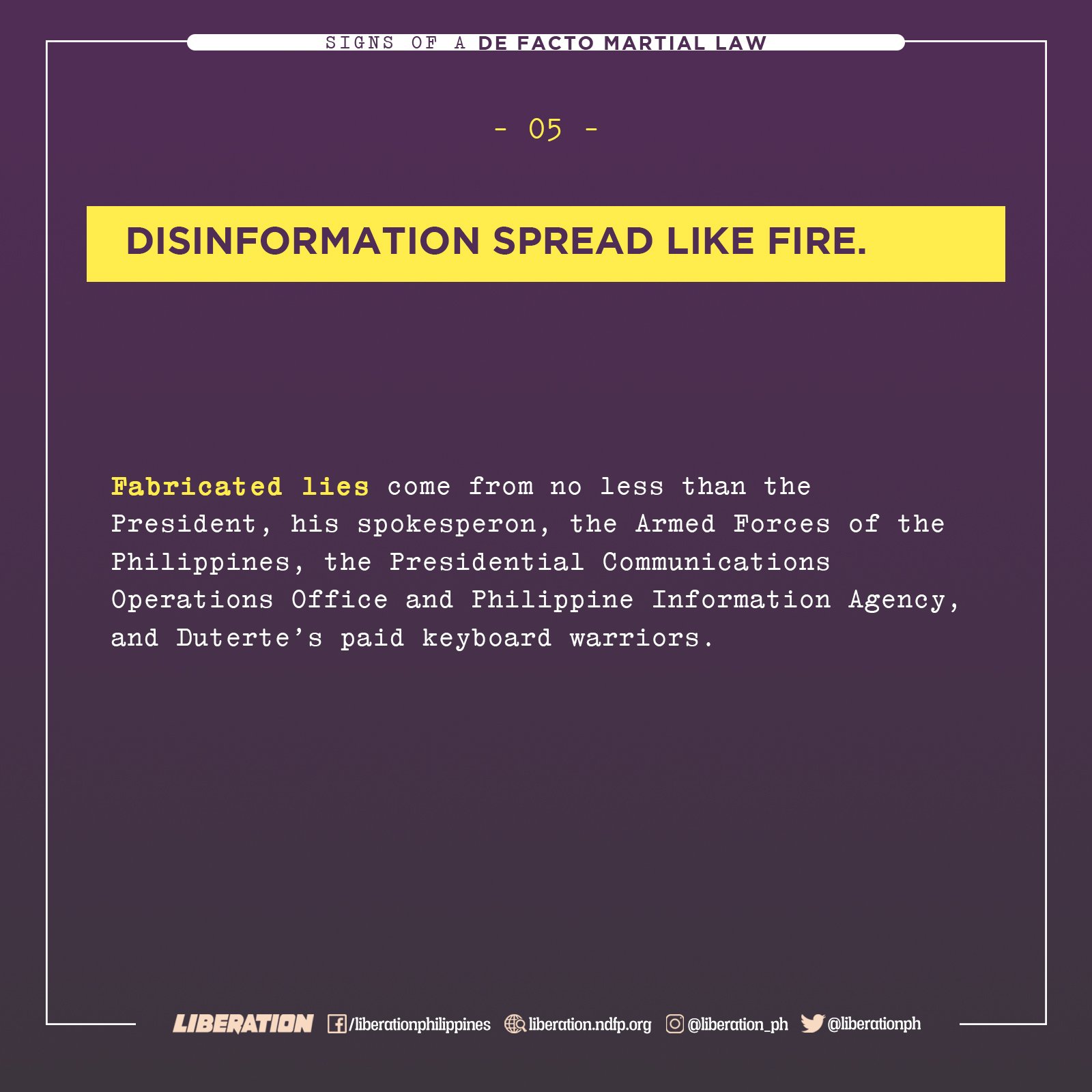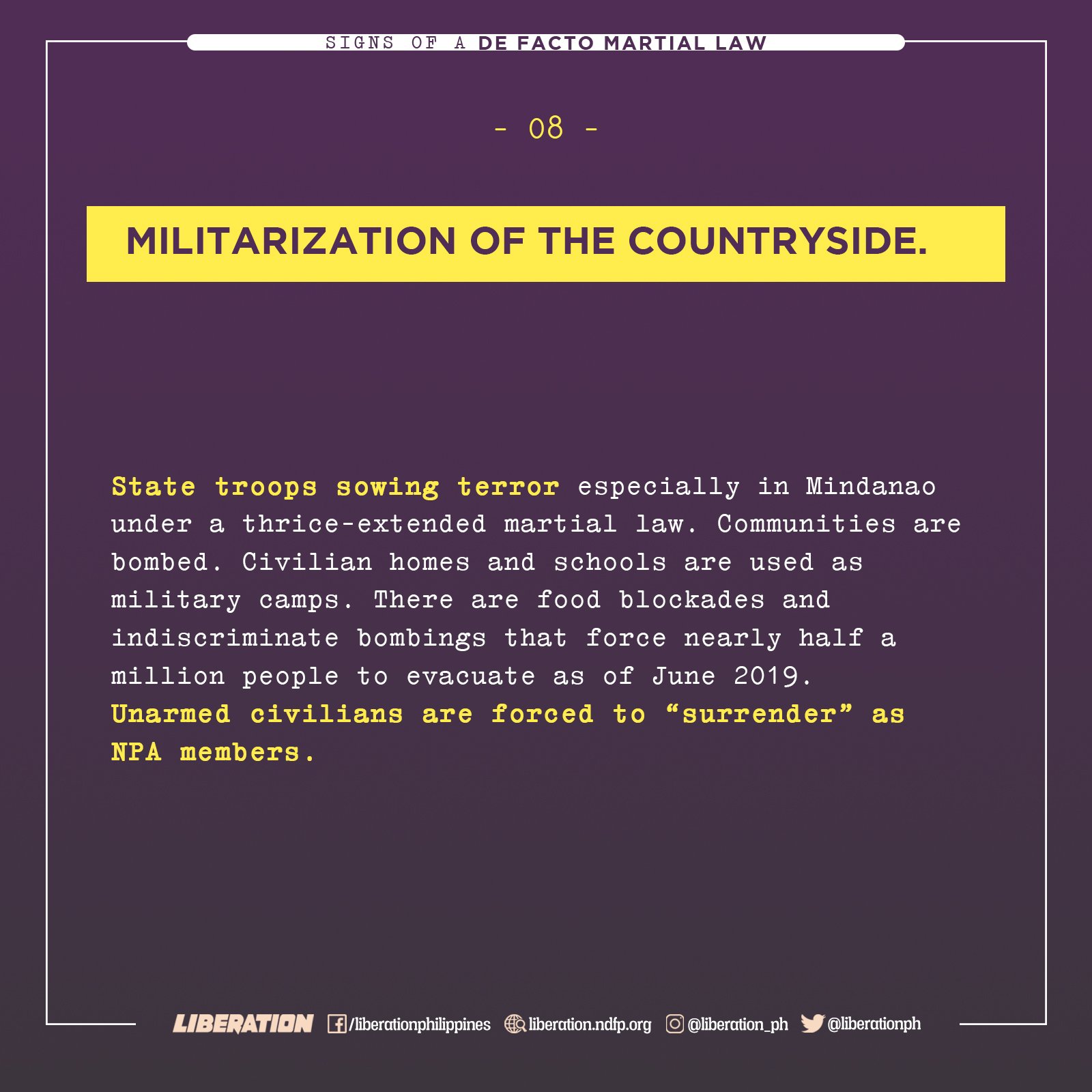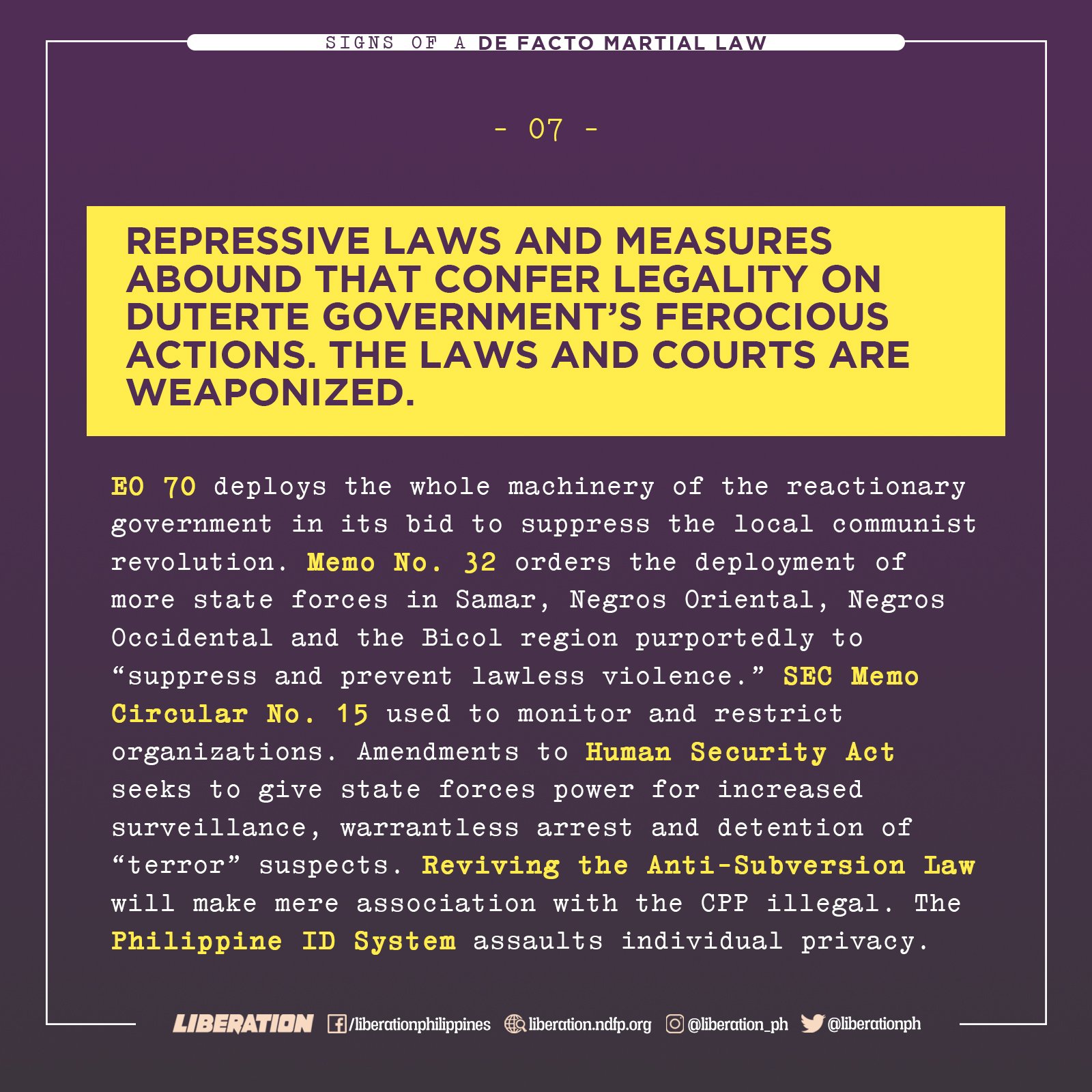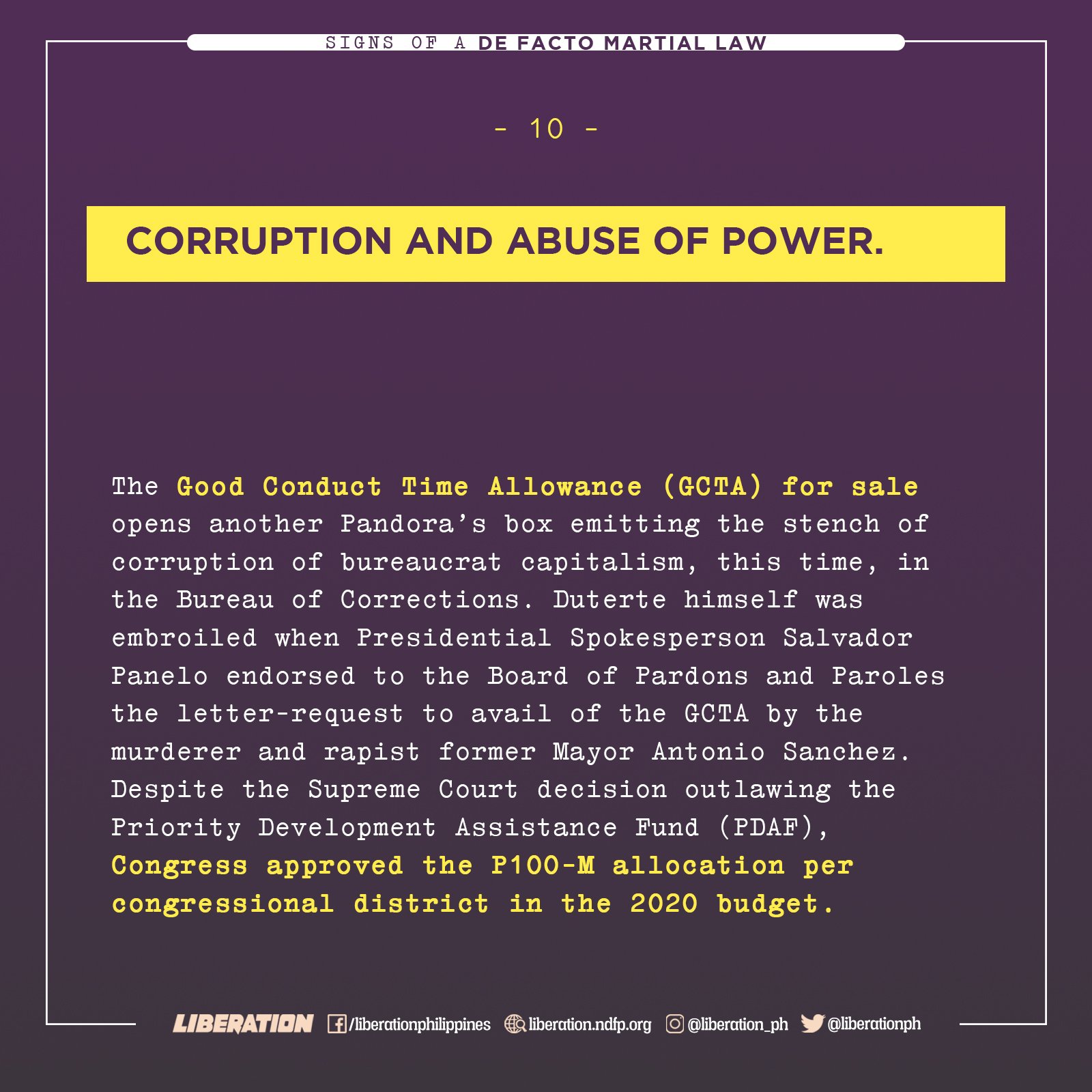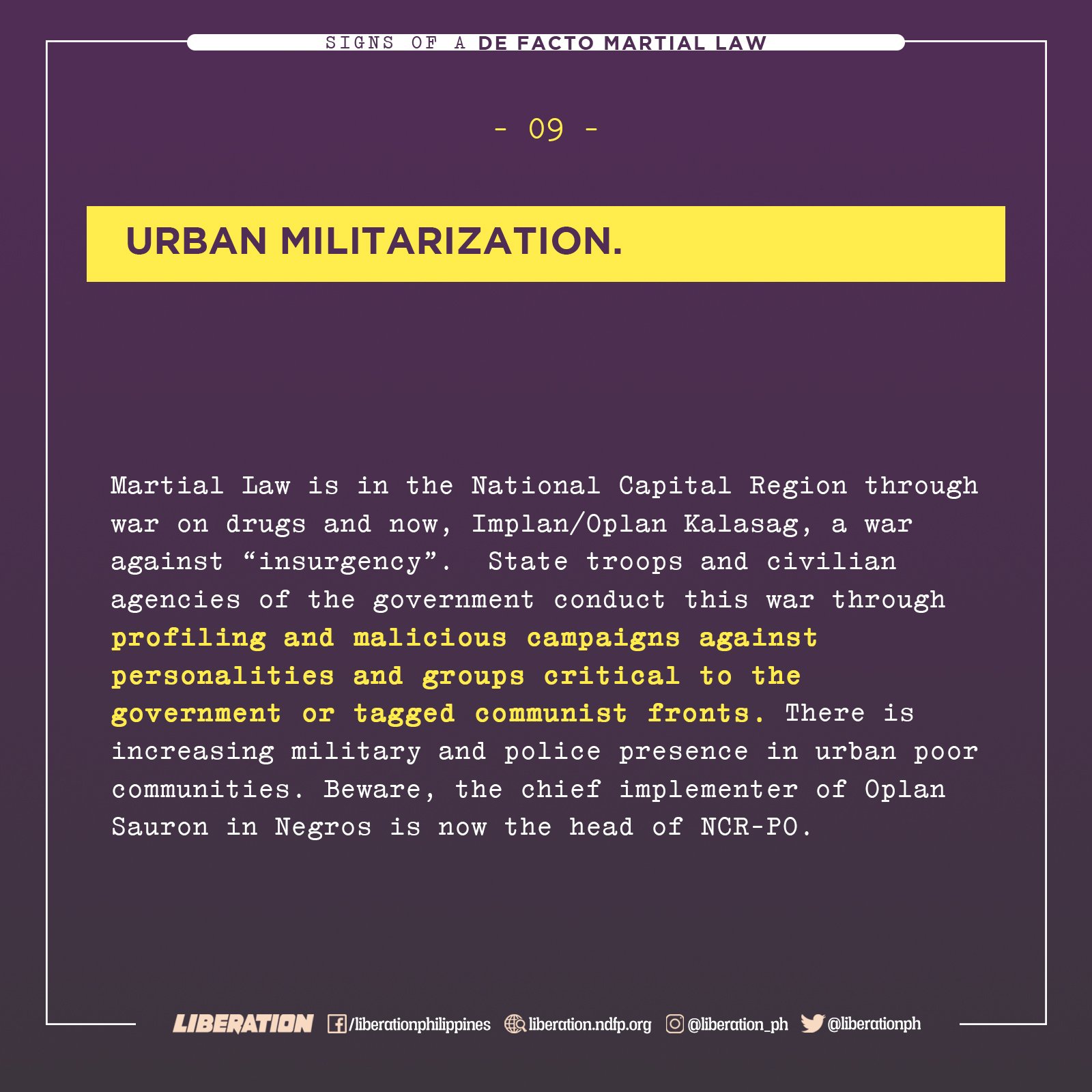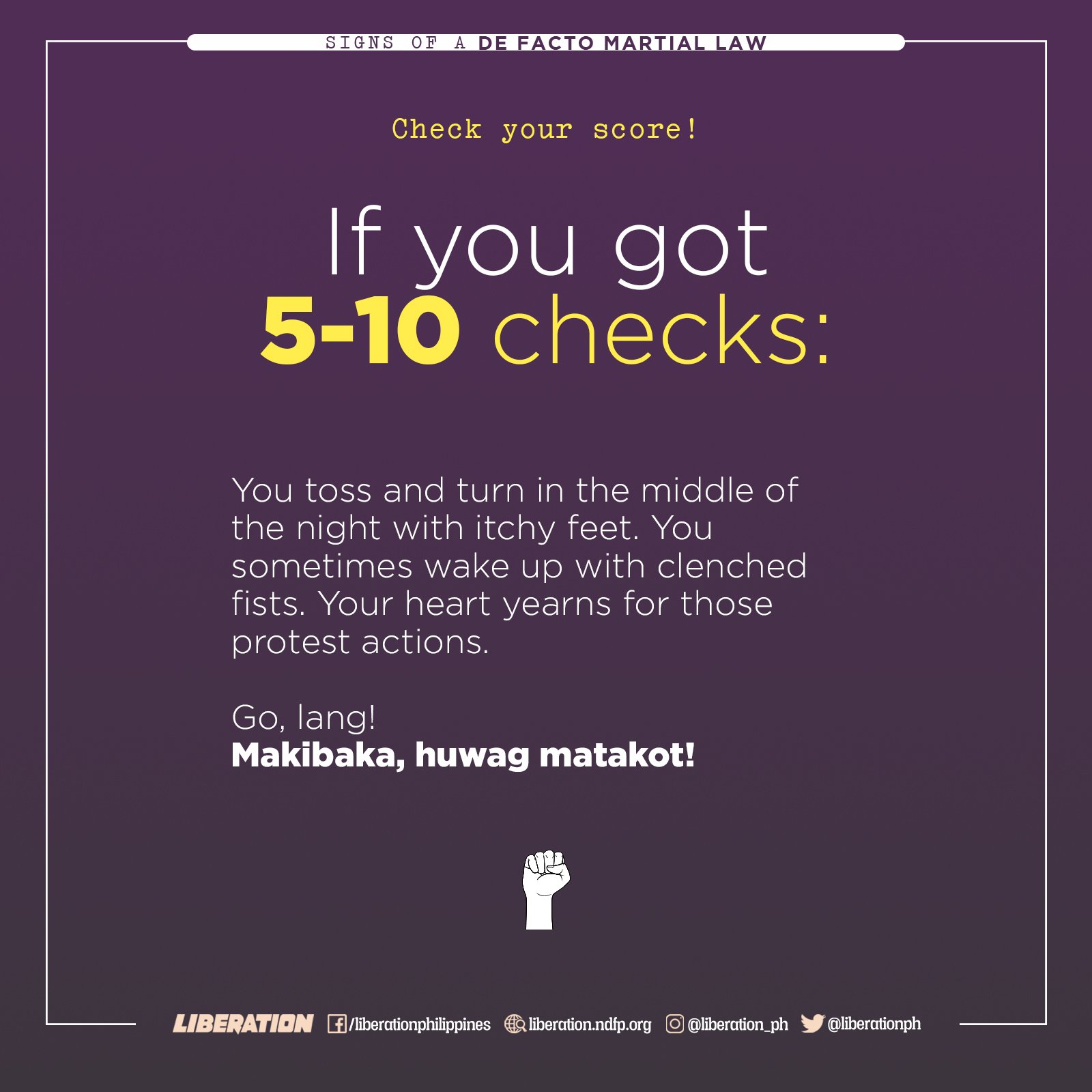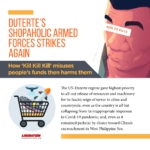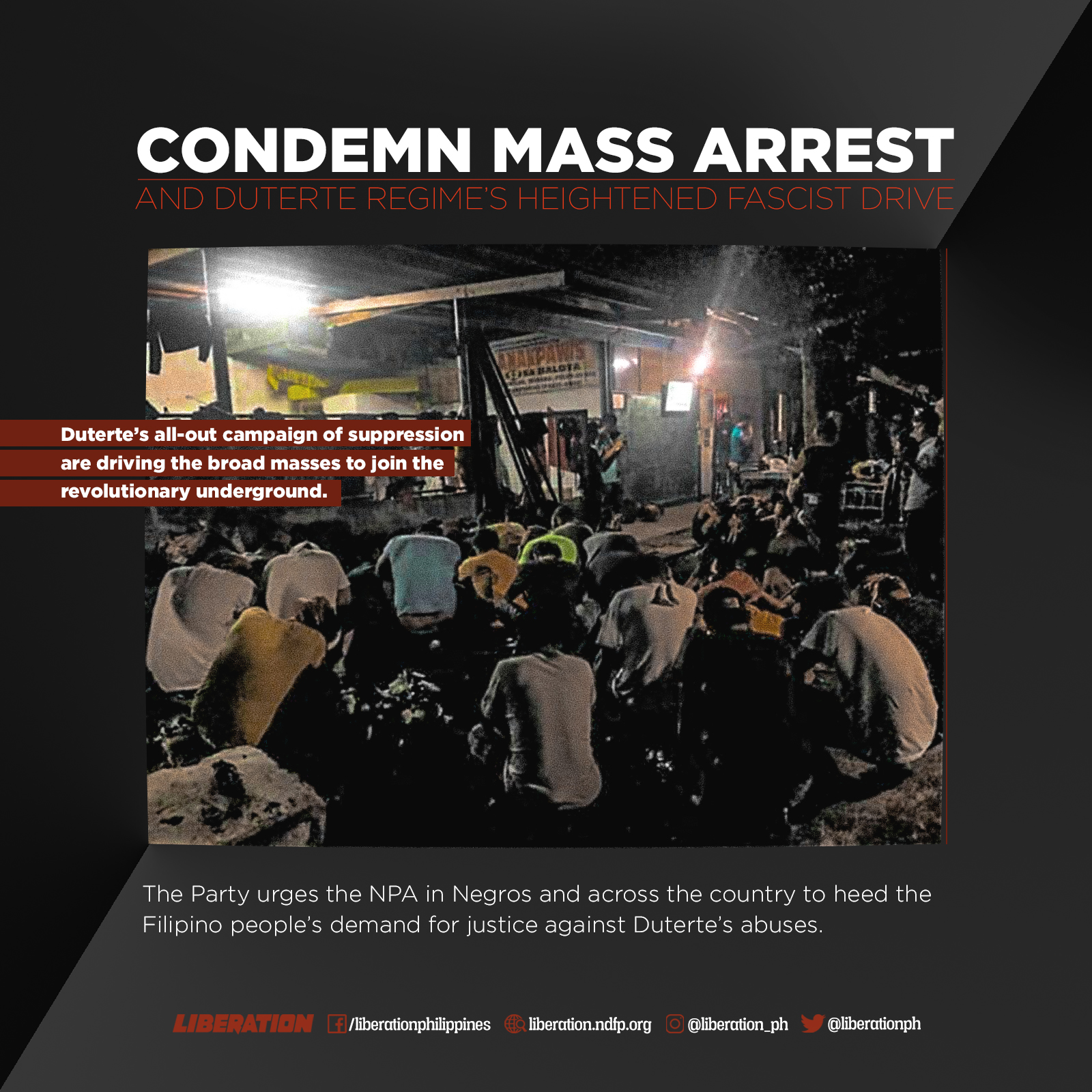Lest we forget: Duterte’s Crimes vs the Filipino people (Part 1)
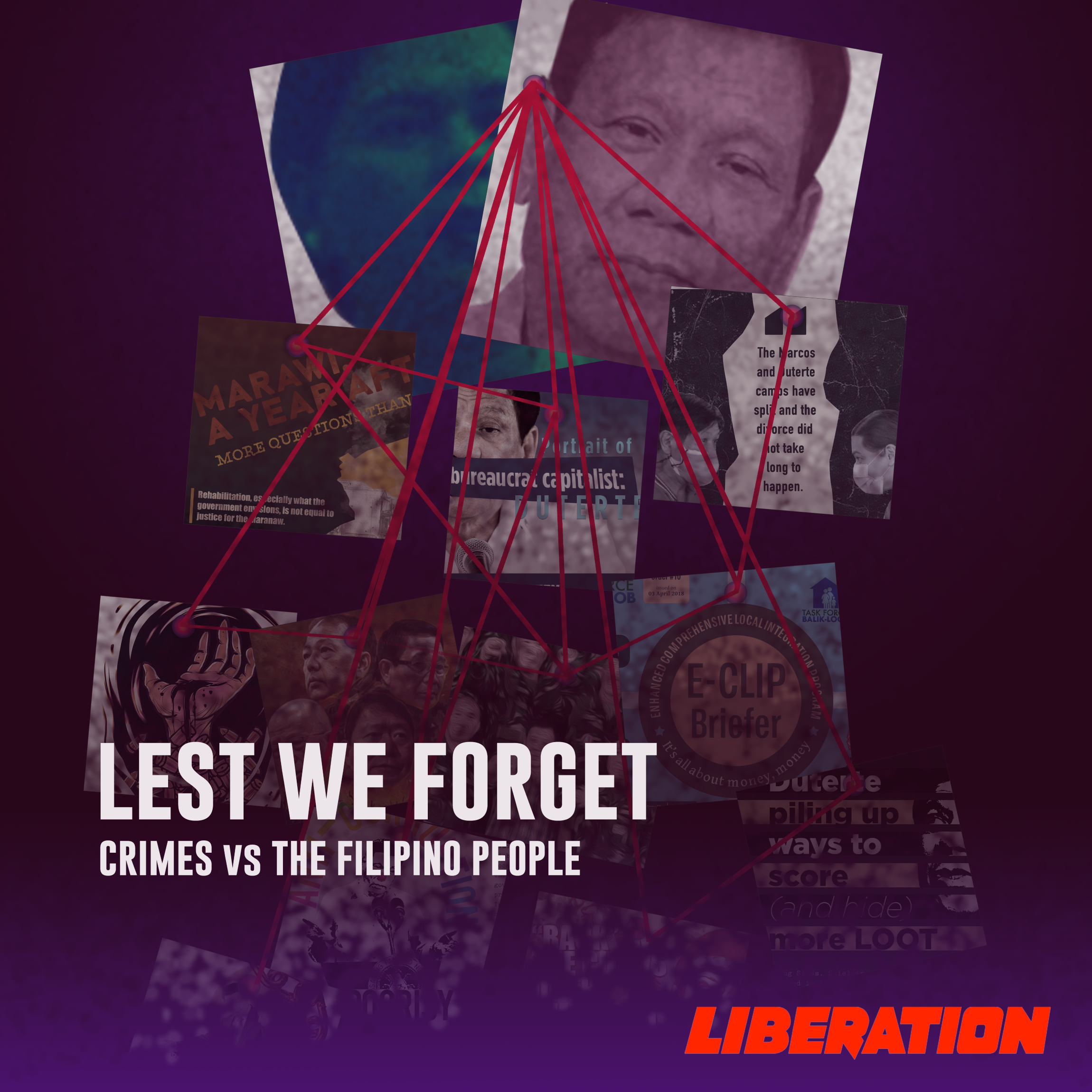
Since the “unity” of the Marcoses and the Dutertes resoundingly shattered this year, their word wars and maneuvers have become increasingly messier. They throw mud at each other as if their rivals were much dirtier. But, even as we get entertained and disgusted by their spectacle, let us keep in mind that in our country’s semifeudal, semicolonial condition:
1. They are the same, though as rival bureaucrat capitalists themselves, they race with each other to take as much power and loot from government positions.
2. Occasionally they would “unite” for benefits, but this never lasts.
3. While in power, the ruling clique would top them all in exploiting and oppressing the people, serving the interests of the big landlords and compradors, and their imperialist masters.
4. When out of power, the former ruling clique would seek to protect its loot, evade liability for their crimes and abuses, and try their darn best to come back to power.
The ex-ruling clique of Rodrigo Duterte has yet to answer for his horrid crimes. Yet, his clique is aiming for a comeback not just in the mid-term 2025 elections but more so in the 2028 presidential elections. At the forefront are his children, the current vice-president Sara Duterte, and his two sons (a city mayor and a congressman).
Read: Gloves off in Marcos-Duterte circus
Duterte managed to score the presidency in 2016 by riding on the people’s discontent with the exiting regime of Benigno Aquino Jr. This time around, the Duterte clique is using the same game plan—riding on the people’s disgust with the incumbent US-Marcos Jr regime.
Read: Duterte: Portrait of a bureaucrat capitalist
The people owe it to themselves to remember that, among others, the Dutertes should be made accountable for the following:
1. Mass murder under the “war on drug” campaign
Duterte raised the culture of impunity in the country to a new level with thousands of extrajudicial killings. From 2016 to 2022, he shocked the country and the world with left and right vigilante killings coupled with his brash and profane way of shielding the police, the military and the paramilitary groups. The kin of the victims brought the case to the International Criminal Court (ICC). In 2018 Duterte removed the Philippines from the ICC to evade its probe on his war on drugs.
By 2024, the ICC has finished the first series of investigations confirming the “systematic and mass killings” under Duterte’s “war on drugs.”
While the Marcos 2 regime announced it is reconsidering re-entry into the ICC, it also said it is not honoring the ICC warrant of arrest. However, Marcos Jr’s minions in the House of Representatives went ahead to create a “mega-panel”, called the quad committee, to probe the interconnection between the extrajudicial killings, illegal drug trade and Duterte’s drug war, the Philippine offshore gaming operators (POGOs), and Chinese syndicates. Also, as of this writing, Marcos’ Justice Secretary Jesus Remulla said his Department “will not hinder the Interpol from executing its duties if the International Criminal Court (ICC) orders the arrest of certain individuals in the country.”
Two years after Duterte left office, there is little legal reckoning for the victims of his regime’s bloody killings, estimated to be tens of thousands. Only eight police officers (mostly low-ranking, never the mastermind) in only four cases were so far convicted.
Read: Solving the drug problem (Part 1)
2. Martial Law, whole-of-nation terrorism
Duterte was mayor of Davao City in Mindanao for decades before he assumed the presidency. Yet, it was Mindanao that he trampled on first and most grievously.
He pounded Marawi for 147 days with the excuse of hunting alleged fighters and allies of ISIS, and then declared Martial Law throughout Mindanao. He caused the evacuation of half a million Moro residents of Marawi and soon, of Lumad also. He ordered relentless killings and brutal military rule, including massacres and closure of Lumad schools, to force the Lumad to give up their right to their ancestral lands.
Duterte’s real purpose then was to clear opposition to the expansion of plantation and mining and logging operations in the mineral-and coal-rich Mindanao. Duterte shamelessly bragged about selling even the ancestral domains of the indigenous peoples to foreign investors.
Read: Marawi a year after: A people’s right to self-determination violated
With Martial Law in Mindanao, Duterte in November 2017, ordered through Executive Order No. 32 a more intense militarization of Negros, Eastern Visayas, and Bicol. He also launched Oplan Sauron and the Synchronized Enhanced Managing of Police Operations (SEMPO) that escalated killings, abductions, and attacks against the legal democratic movement and peasant communities. EO 32 came on the heels of the Duterte regime’s unilateral termination of the peace negotiations with the National Democratic Front of the Philippines (NDFP) in August 2017.
Subsequently, Duterte issued Executive Order No. 70 in December 2017 creating the notorious National Task Force to End Local Communist Armed Conflict (NTF-ELCAC) and placing the entire government machinery with its resources “at the behest of Duterte and his military gang junta for their whole-of-nation terrorism,” said Ka Oris, the spokesperson of New People’s Army-National Operation Command in 2018. The “whole-of-nation” approach is patterned after the United States Counter-insurgency Guide of 2009, the same framework used by the previous regimes of Gloria Arroyo and Benigno Aquino Jr in their “counterinsurgency” campaigns against the revolutionary movement led by the Communist Party of the Philippines (CPP).
In 2020, while the people were hard-pressed with lockdowns during COVID-19 pandemic, the Duterte regime railroaded the passage of the Anti-Terror Act. Under this law, anyone who dares to air protest or grievance against the regime is automatically tagged as a “communist terrorist” or “supporter of communist terrorists.”
Read: State terrorism normalized amid COVID-19 pandemic
Read: Killing of activists high priority of Duterte regime
The law contains provisions on arbitrary proscription and designation of individuals and organizations as “terrorist.” It removed safeguards on human rights such as warrantless arrests and detention. It violates even the reactionary state’s own Constitution. The “Anti-Terrorism” Law (ATL) became the most questioned law before the Supreme Court with 37 petitions for its nullity.
Using the law, the regime persecuted activists, leaders of people’s organizations, lawyers, human rights workers, even humanitarian organizations. The Philippine UPR Watch (Universal Periodic Review) cited 112 individuals charged with ATL and Terrorist Financing (Republic Act 10168) with 53 organizations/individuals whose Bank Accounts and Assets were frozen.
Read: “My Soldiers”: The Duterte regime’s backbone
Read: In between Duterte’s late night shows, who’s on the stage?
3. Corruption
Duterte has yet to answer for his regime’s militaristic rather than health-oriented response to the COVID-19 pandemic. On top of that, his clique has yet to be held accountable for the gargantuan fund mismanagement of the Philippine Health Insurance Corporation or PhilHealth, the agency co-financing Covid-19 testing and treatment. In 2021, illegal or invalid fund releases were estimated at Php15 billion.
Philhealth only comes second to the Pharmally scandal, Duterte’s biggest money-making venture during the pandemic through his long-time friend and former economic adviser Michael Yang. With less than Php 600,000 capital, Pharmally bagged 13 contracts from the government on Sept. 2, 2019 worth Php 11 billion for overpriced medical supplies.
Aside from Philhealth and Pharmally, there is no closure yet to revelations of mafia-like corruption in the Departments of Public Works and Highways, Health, Education, Transportation, Information and Communication, Bureau of Correction, and Bureau of Customs. A 2021 report by the inquirer.net (“COA red flags reach nearly every corner of Duterte bureaucracy”) said many government agencies have irregularities in finance handling.
Read: The anti-corruption hypocrisy
Read: Duterte piling up ways to score and hide more loot
Duterte gained favor from the military by intensifying the corruption here that were introduced by his predecessors, for example the so-called pabaon (pocket money) for retiring AFP officials. With Duterte’s NTF-ELCAC, AFP generals and police commanders have grown more addicted to war-and-profit. The NTF-ELCAC’s Barangay Development Program (BDP), called by the CPP as the money pit of corruption, is among the milking cows of military leaders with its billions of peso budget. Most projects were white elephants and unaudited. Military and police officials also line their pockets through the Enhanced Comprehensive Local Integration Program (E-CLIP), the regime’s “surrender” program that offers payment for every “surrenderer.”
Read: Duterte’s surrender program is a scam
Read: E-CLIP Briefer: It’s all about money
4. Rehabilitation of the Marcoses
Given that the Marcoses and the Dutertes are the biggest political dynasties contending in the upcoming reactionary elections, it seems ironic that among Duterte’s legacies is his regime’s contribution to the rehabilitation of the Marcoses.
Duterte is an unabashed fan of the late dictator Ferdinand Marcos, who was notoriously known for plunder, puppetry, cronyism, and tyranny. Indeed, Duterte also imposed martial law in Mindanao and held the entire country captive through various executive orders and repressive laws
One of Duterte’s earlier “achievements” during his term was helping former chiefs of bureaucrat capitalists such as Ferdinand Marcos and Gloria Macapagal-Arroyo evade punishments for corruption and war crimes. The Marcoses sought to grandly rehabilitate themselves during the Duterte presidency when the late dictator was buried stealthily at the Libingan ng mga Bayani. Also, decades-long graft and corruption charges filed against the Marcos heirs and beneficiaries were dismissed.
Read: Marcos burial is history’s reversal
Read: Rehabilitating the enemies of the people
Read: Marcoses political rehabilitation bodes more tragedy for the nation
5. Sellout of Philippine sovereignty and dragging Philippines to US-China conflict
As an editorial of CPP’s Ang Bayan once wrote in February 2021, Duterte is treating Philippine sovereignty like a commodity. Duterte smooched China to fund his Build Build Build (BBB) projects then looked the other way when fisherfolk reported China’s building of military facilities in the West Philippine Sea. This was in exchange for loans from which Duterte got bribes and favors.
Read: BBB building the road to perdition
Read: Duterte is exposed as a traitor and paid agent of China
Yet, Duterte’s puppetry also gave more benefits to the imperialist US. In 2017, Duterte promised then US President Trump he would terminate the peace negotiations with the NDFP; that he would crush the armed revolutionary movement; and he would push charter change to allow foreign capitalists to fully own landholdings, businesses, and other resources in the Philippines. He lifted the suspension of the Visiting Forces Agreement (VFA) and came out with a more pro-US proposal called EDCA (Enhanced Defense Cooperation Agreement) which, among other things, allows the US to store missiles and weapons in Philippine territories, in exchange for weapons and military aid.
Later that same year, the “Operation Pacific Eagle–Philippines” agreement with the US was set which considered the country as a second front of the US “war on terror”.
Read: Back in the claws of the American eagle
Read: Kill, kill, kill misuses people’s funds then harms them
6. Economic collapse
Arguably, each puppet president contributes and achieves the worst during his or her own time. But under Duterte, even without or before the pandemic, the economy was already on a downward trend, worsened by his epic failure of coronavirus pandemic response. Agricultural production went down even as rice importation reached 15 percent from 5 percent in 2016. When Duterte’s term ended, the number of unemployed Filipinos grew to 3.7 million from 2.4 million. Inflation was 4.9 percent in May 2022 compared to 1.3 percent in June 2016. Duterte ramped up borrowings, leaving behind almost Php 13 trillion in debt.
Duterte’s boasts could not erase the fact that he bankrupted and pushed the Philippines deeper into poverty. (Pinky Ang) ###
Read: Dutertenomics: The problem is fundamental

